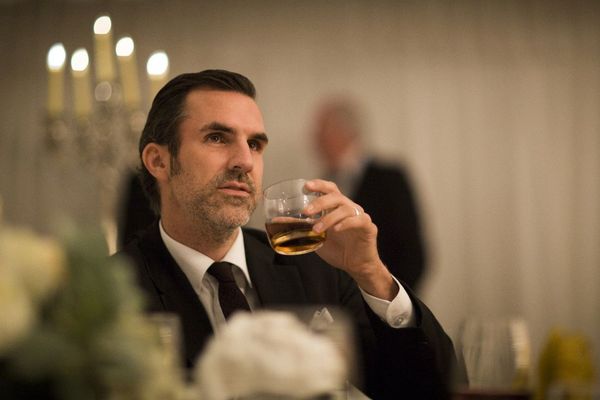 |
| Paul Schneider as Christian embarks on a rampage of unexpected destruction. |
The Daughter, Simon Stone's adaptation of Ibsen's The Wild Duck set in Australia, stars Geoffrey Rush, Sam Neill, Miranda Otto, Odessa Young, Ewen Leslie, and Paul Schneider with Anna Torv and Wilson Moore.
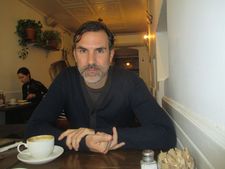 |
| Paul Schneider: "I'm always interested in giving the director flavors within a certain bandwidth." Photo: Anne-Katrin Titze |
Over breakfast, I spoke with Paul Schneider on The Daughter and how producer Jan Chapman and Jane Campion's The Piano inspired him to go to film school. We also discussed his work with Christophe Honoré, the influence of Jack Lemmon and Shirley MacLaine in Billy Wilder's The Apartment, Andrew Dominik's The Assassination Of Jesse James By The Coward Robert Ford, meeting Nick Cave, and watching Kelly Macdonald and Ewan McGregor in Danny Boyle's Trainspotting to develop a Scottish accent for Bright Star.
The Daughter begins with gunshots and the wounding of a caramel-coloured duck. The shooter is Henry (Geoffrey Rush), the owner of a presently folding lumber business. This becomes a disaster for a large number of the local population. Henry's son Christian (Paul Schneider) returns home from America for his father's wedding to Anna (Anna Torv) a blond, much younger woman whom at first glance you might mistake for the wedding planner.
Christian is an angry man. He recently stopped drinking and his relationship with a woman named Grace (Ivy Mak) is on the rocks. Back in the house he grew up in, his mother's suicide looms over the memories of places and people. At a supermarket he runs into his old, and once best friend, Oliver (Ewen Leslie) and his wife Charlotte (Miranda Otto) whom he had never met.
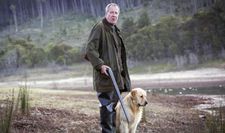 |
| Geoffrey Rush as Christian's father Henry Photo: Anne-Katrin Titze |
Oliver, who lost his job during the closing, welcomes his friend with open arms into his much humbler home near the woods, which he shares with his father Walter (Sam Neill) and daughter Hedvig (Odessa Young). Hedvig and Walter are the guardians of a small, home-made animal sanctuary that houses, besides rabbits and parrots, our injured friend from the start of the film - Lucky, the duck, who is now being rehabilitated.
Christian, played with intense confusion by Schneider, is like a bloodhound smelling old injuries and attempting to get a fresh bite off the many skeletons in the closets all around him so as not to have to confront his own. The Daughter out of the remains of Ibsen, contains a potent tale about fatherhood and the pitfalls of trying to be a saviour.
Anne-Katrin Titze: You just said as we sat down that there are two kinds of actors?
Paul Schneider: Yeah, one kind, you know, they love themselves and they're happy to advertise that love affair. And then the kind of actor who hates themselves and they only act because they're desperate to get away from themselves. If you fall into the latter camp, it's only when you're doing press that you're confronted with the reality. Tough for anyone to do - talk when you're so conscious of what you say and how you speak. Especially when you're the kind of person who thinks while they talk.
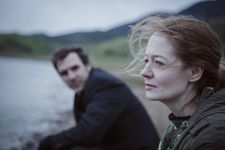 |
| Christian (Paul Schneider) confronts Charlotte (Miranda Otto) |
AKT: I really want to talk about the work. I'm not interested in laying a trap for gossip.
PS: It's a madness, you know?
AKT: Some people are so slick and so good at promoting themselves.
PS: I don't know if that kind of approach would be better for my career. But that kind of pre-planning to me seems very exhausting.
AKT: I just re-watched Nanni Moretti's Mia Madre (My Mother). Have you seen it?
PS: I know Nanni Moretti but I'm not familiar with that one.
AKT: Margherita Buy plays his alter ego in it. She is a movie director who keeps telling her actors: "I want the actor next to the character!" And John Turturro [as actor Barry Huggins] is completely confused what that could mean. What is funny about The Daughter is that your character is constantly being asked: "Who are you?"
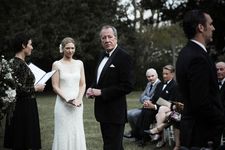 |
| Anna (Anna Torv) marrying Henry with Christian getting the look from his father |
PS: Am I?
AKT: Yes, twice by the Sam Neill character who then remembers that he taught you to play football. At another point you are being asked "Are you American?" And your answer is "I'm not sure."
PS: Yeah, I wanted that to be in there. I was very concerned about that part. He [Christian] was rejecting his father's Australian-ness and trying to embrace his mother's American-ness. Also, you can't learn to do an Australian accent in 25 days.
AKT: The Wild Duck is one of my favorite Ibsen plays.
PS: Oh really?
AKT: Maybe because I'm also a wildlife rehabilitator and I have rescued quite a number of waterfowl. I relate to that part of the play. I was surprised by some of the changes made for The Daughter. Had you read the play before?
PS: I didn't know the play before. I had heard of it. I don't have any great knowledge of theatrical literature. It's not what I studied. I read the script and then I went back and read the play.
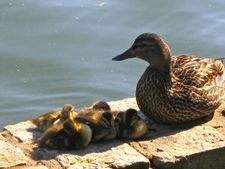 |
| The Wild Duck with her ducklings in Prospect Park Photo: Anne-Katrin Titze |
AKT: Did you see any film versions of The Wild Duck?
PS: No.
AKT: There is one with Bruno Ganz. That was Jean Seberg's last role. She plays Gina - Charlotte in this version, the Miranda Otto role.
PS: Oh, really? When was that?
AKT: 1976.
PS: She killed herself, no?
AKT: Yes. In the film [directed by Hans W. Geißendörfer] Bruno Ganz plays your part.
PS: Well, it's good that I never saw it.
AKT: Yours is the part the audience questions most. Who is this man? Why is he doing what he does?
PS: I mean for The Daughter it occurred to me that Christian was almost like someone who had gone through some kind of religious conversion. Or someone who was a drug addict and had gone to rehab or an alcoholic who is now AA or something. There was some kind of devotion to this new idea or this new way of doing things. And he was going back to his home to tell them - this is the way it works.
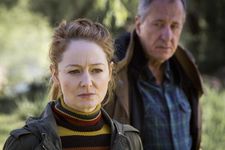 |
| Oliver's wife Charlotte with Henry |
AKT: The saviour?
PS: Exactly. When people go home and they talk to their parents on the holiday and they say: You shouldn't eat so much sugar! You know, he goes back with this idea that everyone should tell the truth and even if it hurts, everything will be okay.
AKT: It is a strong moment when he realises that he just didn't know the full truth.
PS: Just like someone who is trying to religiously convert you or talk to you about Jesus in the subway. When I'm in the subway and someone is yelling about Christianity, I don't have a sense that they would like to have a conversation about it. It's a very one-way street. People aren't drawn in by that kind of informational attack.
I'm just thinking, now that we're having this conversation, I have scraps of memories of my ideas about Christian when I was reading the screenplay. Those ideas may be sort of helpful or guide me when I'm making a film.
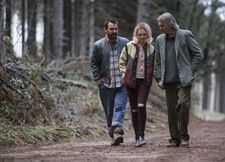 |
| Oliver (Ewen Leslie) and Hedvig (Odessa Young) with her grandfather Walter (Sam Neill) |
But there's two big factors if these ideas mean anything to anyone else. That is A) Can I express those ideas in a way that shows up on film? And B) Is the director interested in those ideas and does the editor cut them into the film? It's interesting when you do interviews and people talk to actors quite a bit. Actors buy into this. Journalists talk to actors as if they are the writer and the director. And actors, some actors are very happy to …
AKT: Take that on?
PS: Yes. I studied editing in film school.
AKT: I took note of a few things about [Veronika Jenet's] editing in The Daughter. When you mentioned the editing working with your idea or not, I thought about one moment where the editing was brilliantly working with what I thought you wanted to convey. The phone call before the wedding ceremony when Grace tells Christian that's it. It worked together beautifully. The disjointed manner transmits that he is ready to cause a lot, a lot of trouble fast.
PS: I hate doing that stuff. It's so hard.
AKT: Scenes like that?
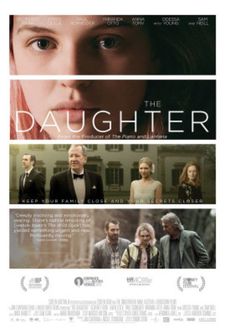 |
| The Daughter poster |
PS: These kinds of scenes, yeah. I mean, I love making movies and they're necessary. It's such a self-conscious event. You know a scene like this comes up and you know that you'll be expected to do something sort of big emotionally and more than likely no one is going to be able to direct you or help you to do that.
You're finding out that your wife is cheating on you or that your son is dead or that your mother is in the hospital - these are things where a director is basically just like - "Well, I hope it's good." You know, fireworks are expected but usually you are given very little direction.
AKT: And then you go out on the ice? It sounds terrifying for a non-actor, just you talking about it!
PS: It's not anything that makes me excited.
AKT: What kind of scene does get you excited?
PS: I like playing scenes where I'm having a hard time understanding what's going on. I like playing guys that are not very smart.
AKT: Do you like watching that, too?
PS: I guess, there are good ones and there are bad ones. I feel like in the writing these days in film and television the best thing that you can be is smart all the time. That gets very boring. Everybody has very clever ways to say everything all the time. Being clever is overrated and it's also not fun to have to do it.
AKT: Christian is not the smartest in what he is suggesting. One of the changes from the play I noticed is that he says to Hedvig she should name the duck and then he comes up with Lucky. He is not very witty. In Ibsen, he is telling her to kill the duck.
PS: He is?
AKT: Yeah. In order to appease her father. If you kill the duck you love so dearly, your father will understand. I was expecting that. I was waiting for you to suggest for her to kill the duck and it never came. Instead you offer to name it Lucky. It made me laugh. Also the name Christian is an invention, his fall from Grace. You don't know why these changes were made, do you?
PS: No. Actors have a certain amount of authorship, obviously, but the amount you can change that in editing is massive, you know … I'm always interested in giving the director flavours within a certain bandwidth. I can only do what I think Christian would do. But this is a human being so he can have many different reactions to a certain situation. Maybe in one take I cry and in one take I laugh a little bit.
AKT: How is that with other actors? For example at the dinner table with Geoffrey Rush?
PS: With good actors, what I aspire to be, there's an etiquette with other good actors - you say to them: "Hey, I was thinking about trying this. Is that going to screw you up in any way?" And they go: "No, I think it's fine." Obviously, there's a million ways to do things.
Coming up - Paul Schneider on the importance of The Daughter producer Jan Chapman, the role Jane Campion's The Piano plays, working with Christophe Honoré and Andrew Dominik, meeting Nick Cave during The Assassination of Jesse James by the Coward Robert Ford, developing a Scottish accent for Bright Star while watching Trainspotting, and the influence of Jack Lemmon and Shirley MacLaine in Billy Wilder's The Apartment and more.
The Daughter opens in the US on January 27.





















